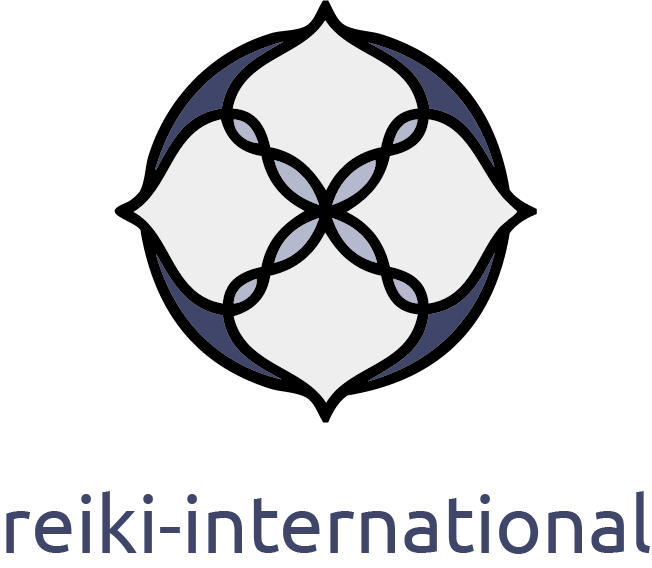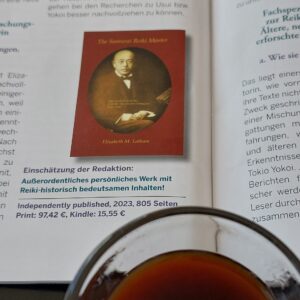The book is controversial. No question about it. Is it relevant to the practice of Reiki? No. A daringly clear statement considering that I have not read the book.
This is a translation with the support of DeepL. The original article is in German.
Is it of consequence for the Reiki teaching as it is taught elsewhere? Possibly. Does it have a consequence for the content of the lessons that Mischa and I teach? No, because for us the historical background is far less important than the practice. ‘History’ has always been more anecdotal than ‘hard facts’ for us.
What counts to us in Reiki 1 and 2
First and foremost is the importance of self-treatment and the simplicity of Reiki. What counts first and foremost is the action and therefore the subjective experiences and the objective results. These are the priorities in teaching all our levels.
Yes, it is useful for Reiki therapists to have a rudimentary knowledge to be able to answer their clients’ questions – knowing that the hands on the body are more meaningful than any words about the historical origins of Reiki. Nevertheless, our students of course learn the ‘rudimentary’. We emphasise that much of the history is based on oral tradition, that Reiki has only been scientifically investigated in the last 10-15 years and is still a work in progress.
However, we believe that we ourselves, and Reiki teachers in general, have a responsibility to educate ourselves beyond the rudimentary. In this way, we can support our Reiki 1 and 2 students when questions from doctors arise, politicians, the judiciary or health insurance companies. This is why René in particular is involved with professional organisations, scientists and researchers. The latest project is a good example …(in German only) related to the scientific databank.
What is important for the 3rd degree
Still, practice is far more important than ‘doctrine’. And if we do get involved with history or science, we are all well advised not to become dogmatic or otherwise think we know the truth. But, admittedly, in the 3rd degree it is helpful to have some knowledge of what is going on in the Reiki world. From this point of view, this article is actually primarily for this specialised audience.
Why ‘controversial’?
Because the book catapults the clinging to opinions to the surface. The discourse surrounding the book questions dogmatism and yet, it cannot prevent itself from creating a know-it-all undertone. It ‘rehabilitates’ where only biased people have made accusations and thus polarises with intentions that are unclear to me.
“But the facts!”
Yes, it may well reveal something new. Yes, the content of the discoveries described in this book may be so serious that future historians will name Mikao Usui more precisely as Tokyo Yokei and, yes, they may uncover the barely comprehensible machinations of supposedly time-honoured organisations. That may be the great value of this book. I use the subjunctive because, firstly, I think academic historians need to verify all this further. And secondly, because I have an ill feeling – which I do honour as my highly personal, subjective perception.
Analogical intermediate thought

The historical William Tell does not exist. That is the current state of historical research. Tell is a legend from the early 14th century and is part of the Swiss founding myth. Does this fact call into question the literary value of Friedrich Schiller’s work, which he created 500 years later? Hardly.
My background with the book
In August 2022, I wrote an article that touched on the modern history of Reiki (usui-shiki-ryoho-monopolised-by-ogm). On the English-language page, the author of this book commented and made statements that I had to reject and correct at the request of contemporary witnesses.
During a conversation at the beginning of 2023, Dr Jojan Jonker told me about the then unpublished book and that he was supporting the author in getting it published. I replied: “Am I glad! Now, I don’t need to read the book myself, I’d rather wait for your summary.” A good three weeks ago, the time had come: at the invitation of ERG, Jojan presented the book to a circle of Reiki Masters and association presidents on Zoom. The author was also present from Australia.
My impression
As indicated above, I question the need to ‘rehabilitate’ Takata. Why does she need to be cleared? Of course I know that she has been accused of distorting history in the past. But you can look at Takata in a completely different light, too: you can be lenient and take into account the spirit of the times. In this way, there is no need to reflexively label inconsistencies as ‘false’ or even interpret them as ‘lies’. (See PS at the end of this article.) To vehemently oppose those who are unwilling or unable to muster such understanding seems questionable to me.
To suggest in retrospect that protagonists in distant lands and in the past (e.g. during reconstruction after the Second World War) had dishonest intentions is speculative and unhelpful. Paradoxically, such insinuations are even counterproductive, as they overshadow the facts that have been set straight and the valuable new insights that have actually been gained are not recognised.
I had an even more disconcerting feeling, which I initially paid little attention to, until I recently spoke to a Reiki Master colleague who put it in a nutshell: Christianity and Western values suddenly seem to take on a presence through the book that would not necessarily be a bad thing in itself, if it were it not for this flavour of … occidential elitism – even the word “neo-colonial” was uttered.
My recommendation
This is a deliberately pointed article. Two articles and a book review in Reiki Magazin 2/24 are more distanced and probably also more objective. There is also this website: reiki-magazin.de/the-samurai-reiki-master. (All in German.)
Book name, author and website
In English language: „The Samurai Reiki Master“ by Elizabeth Latham, samurai-reiki-master.odoo.com

René Vögtli
PS In June last year I gave a talk at the ‘History and Science Meeting’ in Portugal entitled ‘Hawayo Takata – historical figure without whom we would not be here’. Download the original in English here: René Vögtli’s presentation ‘Hawayo Takata’ 2023

João Magalhães, Frank A Petter, Nathalie Jaspar, Silke Kleeman and Amanda Jayne, Rika Saruhashi, René Vögtli


